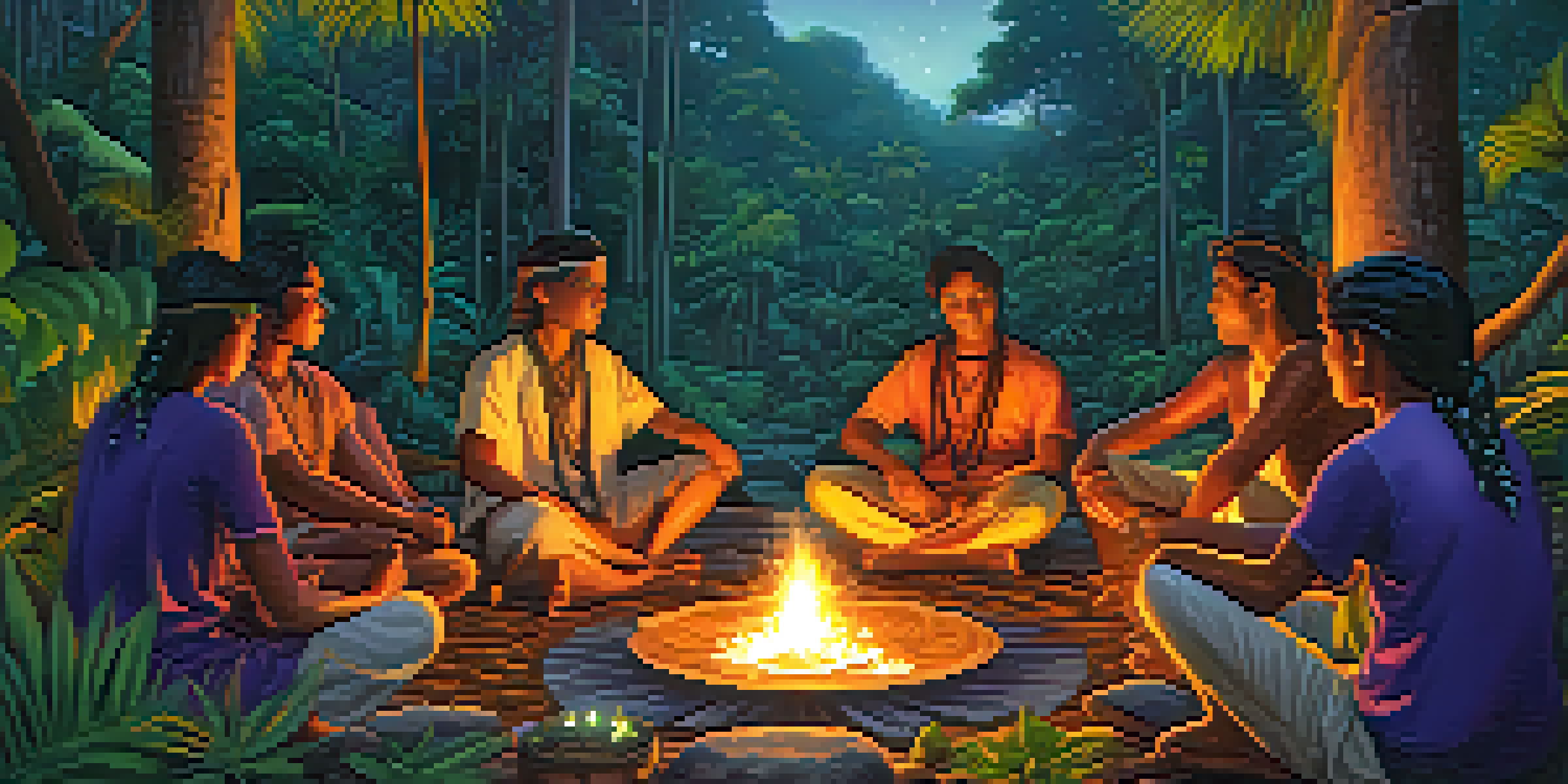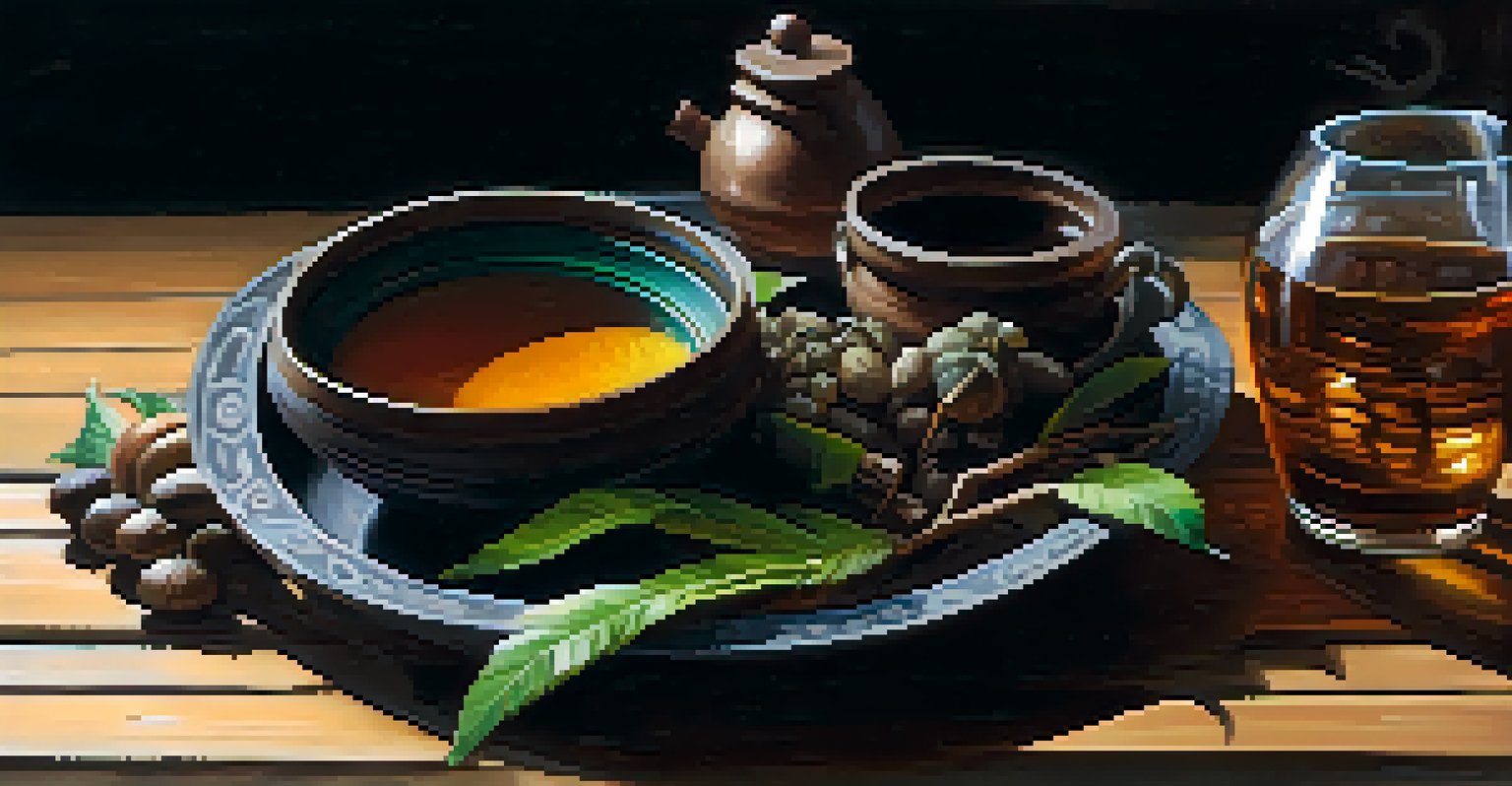Cultural Exchange: Ayahuasca in Global Spiritual Practices

Understanding Ayahuasca and Its Origins
Ayahuasca is a powerful brew made from the Banisteriopsis caapi vine and other plants, primarily used in traditional Amazonian shamanic practices. Its origins trace back to indigenous cultures in the Amazon basin, where it has been utilized for centuries for healing and spiritual insight. The term 'ayahuasca' translates to 'vine of the soul,' reflecting its deep connection to personal and communal spirituality.
Ayahuasca is not a panacea, but it can catalyze profound insights and healing.
This sacred beverage is not just a drink; it’s a conduit for experiencing altered states of consciousness. Participants often seek out Ayahuasca ceremonies to confront emotional pain, gain clarity, or connect with a higher power. The ritualistic context in which it is consumed is equally important, emphasizing community, guidance, and respect for the natural world.
As cultural exchange has accelerated in our globalized society, the use of Ayahuasca has begun to spread beyond its traditional roots. This has sparked both interest and debate, as people from diverse backgrounds seek to understand and incorporate this potent spiritual tool into their own practices.
Ayahuasca in Modern Spiritual Practices
In recent years, Ayahuasca has gained popularity among those seeking alternative spiritual experiences and personal growth. Many Westerners travel to South America to participate in Ayahuasca retreats, often led by experienced shamans. These retreats are marketed as transformational experiences that offer participants a chance to explore their inner selves in a safe and supportive environment.

However, the rise of Ayahuasca tourism has raised questions about cultural appropriation and the commercialization of traditional practices. Critics argue that this trend risks diluting the rich cultural significance of Ayahuasca ceremonies. It's essential to approach these experiences with respect and understanding, acknowledging their roots and the wisdom of the indigenous peoples who have safeguarded this knowledge for generations.
Ayahuasca's Cultural Roots Matter
Understanding the indigenous origins of Ayahuasca is essential for respectful engagement and appreciation of its spiritual significance.
As the global interest in Ayahuasca continues to grow, there's a call for greater awareness and education about its cultural significance. By honoring its origins, participants can ensure that their experiences are respectful and contribute positively to the broader dialogue on spirituality.
Ayahuasca and the Journey of Self-Discovery
Many individuals report profound experiences of self-discovery during Ayahuasca ceremonies. The brew often catalyzes intense emotional and psychological experiences, allowing participants to confront their fears and traumas. This journey can lead to a deeper understanding of oneself and a renewed sense of purpose.
The journey of self-discovery often requires us to confront our deepest fears and traumas, and Ayahuasca can be a powerful guide in that process.
For example, someone grappling with loss might find clarity about their grief through visions and insights facilitated by Ayahuasca. These experiences can be transformative, providing not just healing but also a sense of connection to something greater than oneself. It’s a reminder that spirituality often involves a journey inward, where true growth begins.
However, it's crucial to approach these experiences with caution and intention. Ayahuasca is not a panacea, and the insights gained can be overwhelming. Participants should seek guidance from experienced practitioners and prepare mentally and emotionally for the journey ahead.
The Role of Community in Ayahuasca Ceremonies
Community plays a vital role in Ayahuasca ceremonies, reinforcing the idea that healing is often a collective experience. Participants gather in circles, sharing their intentions and supporting one another throughout the journey. This communal aspect can foster a sense of belonging and interconnectedness that enhances the overall experience.
The presence of a shaman or facilitator is also key, as they guide participants through the process with their expertise and understanding of the brew's effects. Their role is not just to oversee but also to create a safe space where individuals can explore their consciousness without fear. This dynamic between the facilitator and participants builds trust and encourages vulnerability.
Community Enhances Healing Journeys
The collective experience in Ayahuasca ceremonies fosters a sense of belonging and interconnectedness, enriching participants' journeys.
Moreover, sharing experiences after the ceremony can be healing in itself. Participants often find solace in discussing their journeys, reinforcing the bonds formed during the ritual. This communal sharing mirrors many spiritual traditions worldwide, where collective experiences serve to strengthen community ties.
Cultural Sensitivity and Ethical Considerations
As Ayahuasca spreads globally, cultural sensitivity becomes increasingly important. Many people engaging with Ayahuasca are from different backgrounds and may not fully understand its cultural significance. Being aware of the historical context and the experiences of indigenous peoples can foster a more respectful engagement with this sacred plant medicine.
Ethical considerations also come into play as the commercialization of Ayahuasca retreats grows. It's crucial for participants to seek out legitimate, ethical practices that honor the traditions from which Ayahuasca originates. This includes ensuring that shamans are respected and compensated fairly for their knowledge and services, rather than commodifying their cultural practices.
Engaging with Ayahuasca requires a commitment to learning and understanding its roots. By doing so, individuals can contribute to a more ethical framework that respects both the plant and the people who have used it for generations.
Ayahuasca and the Global Spiritual Landscape
The integration of Ayahuasca into global spiritual practices reflects a broader trend of seeking alternative paths to spirituality. As more individuals move away from traditional religious structures, they are turning to practices like Ayahuasca that promise personal insight and healing. This shift highlights the human desire for connection, understanding, and transcendence.
In this new spiritual landscape, Ayahuasca is often seen as a tool for personal transformation and awakening. Many participants report feeling more connected to nature, themselves, and others after their experiences. This sense of interconnectedness aligns with many spiritual teachings, suggesting that we are all part of a larger whole.
Ethics in Ayahuasca Practices
As Ayahuasca tourism grows, ethical considerations regarding cultural appropriation and fair compensation for shamans are increasingly important.
However, this growing interest also necessitates careful consideration of how these practices are shared and adapted across cultures. By fostering respectful exchange, we can honor the roots of Ayahuasca while allowing it to enrich spiritual practices worldwide.
Future Directions for Ayahuasca and Cultural Exchange
Looking ahead, the future of Ayahuasca in global spiritual practices will likely involve ongoing dialogue about its cultural significance. As interest continues to grow, there will be opportunities to deepen understanding and appreciation for its roots. This may involve more educational initiatives that highlight the importance of indigenous knowledge and perspectives.
Additionally, as more people engage with Ayahuasca, there’s potential for collaborative practices that honor both traditional and contemporary approaches to spirituality. This could lead to new forms of healing that incorporate the wisdom of various cultures, creating a rich tapestry of spiritual exploration.

Ultimately, the journey of Ayahuasca is about more than just individual experiences; it’s a collective journey toward understanding and respect. By prioritizing cultural exchange that values the contributions of all involved, we can ensure that Ayahuasca remains a meaningful and transformative practice for generations to come.